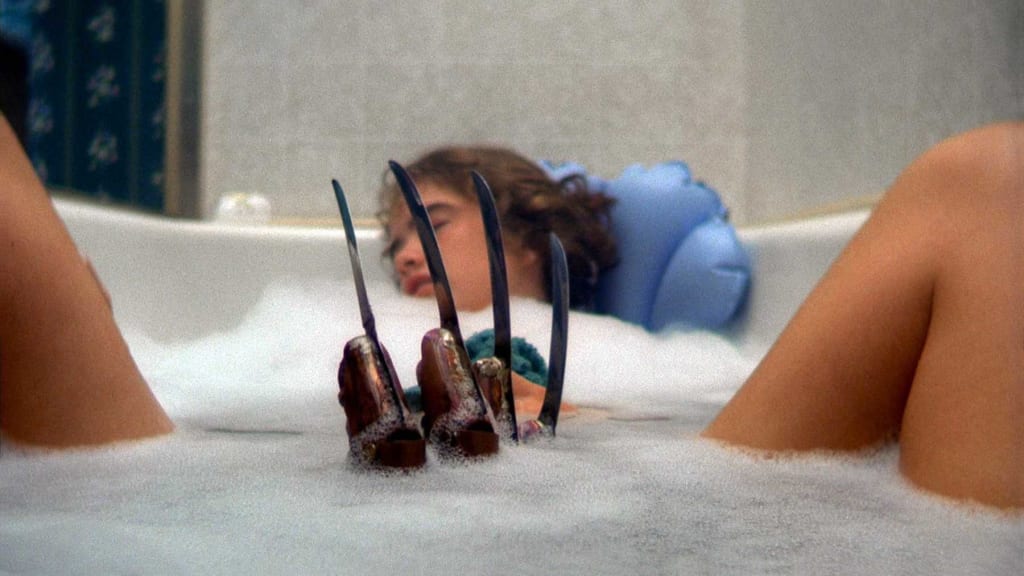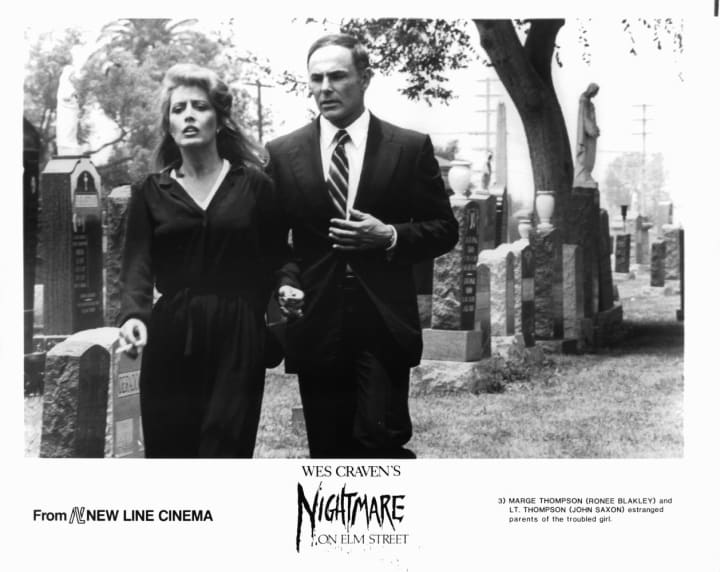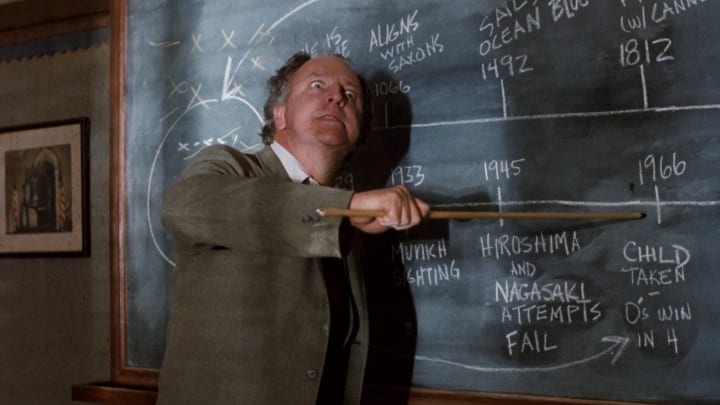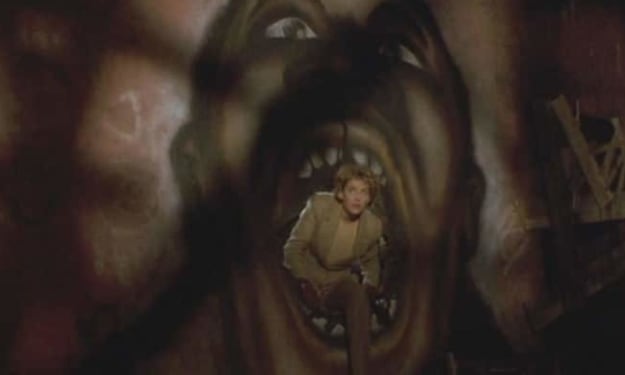
Horror before the slasher genre permeates in a traditional, black-and-white world. Think Dracula, Wolf Man, and general gothic horror. In some of these films, the monster can have some sympathy from the audience. Tragedy comes into play as well. Nonetheless, this monster is still a force of evil, who meets their defeat by the shining white knight in a sense. A Nightmare on Elm Street goes against the type. No doubt, Freddy Krueger comes from tragedy and meets a demise by mob rule. However, we do not sympathize with him, regardless of the injustice of his death. With the time in America's history, A Nightmare on Elm Street represents a loss of innocence.
The year is 1984, and only a decade has passed since Watergate, with the resignation of President Nixon. The first time a sitting U.S. President resigns from office. The United States withdraws from Vietnam for good in 1975. Here, we have a war that creates what critics call 'baby killers' and a large divide within the American public. Americans see the hubris of their country on television, with men pushing helicopters off into the water to make room for refugees. A decade prior is the assassination of President Kennedy in his limousine. America's history is on a downturn since 1963, so it looks and feels. By 1984 one may surmise with Reagan's 'It's Morning in America again' good times return, right? Maybe but not really.
Destruction of The Family
Many Americans pride themselves on their family and their family values. We see this in the media of television, film, especially politics. Most of the time, we try to pass these values down through the media as well. A whole generation of people remembers and grew up on Leave It to Beaver. Just a T.V. show for some, but others a representation of America...or what America should be. People love the traditional, nuclear family structure.
In Wes Craven's film, we can see the nuclear family is diminishing. Amanda Wyss' character of Tina lives in a fatherless home. We learn later her father abandoned her and the mother ten years ago. Meanwhile, Tina's mother has a boyfriend, mainly interested in sex as he groans 'when are you coming back to bed' when she checks in on her daughter in the middle of the night. When Tina meets her demise, her mother is out of town in Las Vegas with said boyfriend. Las Vegas of all places, or Sin City to some. Yes, Tina is somewhat self-reliant being a teenager. By no means is this an excuse on the mother's behalf. Tina's mother's discussion with her daughter on her nightmare is brief and not overly supportive. Combine this with the mother not being present - one cannot help but feel the mother has no interest in parenting.
Rod Lane is Tina's boyfriend, a young man involved in violence, drugs, and overall things your parents try to protect you from in the world. We never come across the parents until Rod Lane's funeral. Where are the parents during Rod Lane's arrest and a stint in jail? They care enough to be there for the funeral. Hence, it is hard not to ask about their presence prior. No confirmation exists on the family's actual current relationship. Is Rod living with them? Are the parents still married? People usually assume that children are like their parents. If not like their parents, their failures come from a lack of parenting. Hence, we have a failed family here due to a criminal teenager.

Nancy's family dynamic is the most prevalent, being our protagonist. Our girl next door has parents who are divorced. Due to the liberalization of divorce laws and second-wave feminism in the seventies, divorces begin to rise. Wes Craven even believes he has the first film ever that portrays a divorced couple. Go back to the seventies with The Mary Tyler Moore Show - the starring character was supposed to be divorced. However, the network still considered divorce too taboo, and they settled on her having a broken engagement instead. Nancy's mother is an alcoholic who barely listens to her daughter. Her father is absent and instead married to his job. After the arrest of Rod Lane, she argues to her father 'you used me' as he tailed her in hopes to get to Rod Lane. Can anyone imagine this in the days of Leave It to Beaver? Even the audience knows for once, the parents are at fault, given they do not listen to their daughter.
One exception may be Glenn's parents, who we can see are still married, with their son. I cannot help but question his mother, though. She is not bothered much by her son wanting to watch 'Miss Nude America' and simply tells her son to go to bed. Again, can you imagine a mother from decades ago being okay with this and doing more than just making snide remarks?
Law and Order
Americans usually pride themselves on our justice system. We are a land of laws, not royal privileges. Everyone is equal in the eyes of the law, or so the idea goes. We are not here to debate this, for that is for a separate discussion. The court acquits Freddy due to a technical reason. Because of this lack of justice in the public eye, they take matters into their own hands. Parents of Elm Street burn Freddy Krueger to death in his boiler room. Afterward, no one makes mention of said incident.

Look at the timeline of the Nightmare on Elm Street franchise history - the events of Freddy Krueger's trial and demise occur in 1966. Americans remember the times of the sixties with racial injustice, the protest of Vietnam, and civil unrest. Come 1968, Americans have Richard Nixon, the originator of the law and order campaign. Yet, the vigilante burning of Freddy Krueger, child killer or not, is a complete disregard for law and order.
In most cases of vigilante justice in America, you find the motivation is due to horrible racism and bias assumptions. Think of public lynchings after the American Civil War. The fact that Freddy Krueger does not meet justice, at least legally, says a lot. Perhaps America's justice system is not the greatest. Now simple, middle-Americans have blood on their hands! Yes, people can claim that Freddy Krueger is an extreme case, but we are having this debate still today. When and where is it okay to turn to mob violence?
Secrecy
Parents always say not to lie, tell the truth. Relationships must build on honesty and openness. Children may lie about their grades in school or who broke what. Our parents and teachers do not lie, or so we believe when younger. We can not be any further from the truth! One benefit for the town of Springwood is the secret remains mostly buried. In 1971 there is the release of The Pentagon Papers, to put bluntly - reveals our government is lying to us and trying to cover it up. The parents of Elm Street are doing the same. Instead of any leaks, the impact of such event shows through fractured relationships like Nancy's parents for example.
In both scenarios, actions stem from 'good intentions' - or so they try to sell it as or try to sell to themselves. We know where lies and secrecy lead. All the time, they come to bite us back, not always directly. Letting such dishonesty stew upsets the younger generations even more. We can see this again in America in such events before the eighties, and the children of Elm Street. Ever since Watergate, many Americans do not believe their government at all. You can apply the same here with Elm Street. Why should we trust the parents and authority figures of Springwood? Trust is not a one-way street!
What makes A Nightmare On Elm Street stand out from most slashers is the motivation of the killer and the morality play. Everyone knows the rules that sex and drugs lead to death of said teenagers. No doubt, these same rules apply to this franchise. Villains like Jason Voorhees operate as a sort of Old Testament God given form, although hideously and monstrously. With Freddy Krueger, he simply kills kids for simply being kids. To quote Billy Loomis - 'it's a lot scarier when there's no motive'. Here, you have the most direct attack on innocence itself.
If you like what you read here, please feel free to leave a like and or tip.
About the Creator
Skyler
Full-time worker, history student and an avid comic book nerd.






Comments
There are no comments for this story
Be the first to respond and start the conversation.